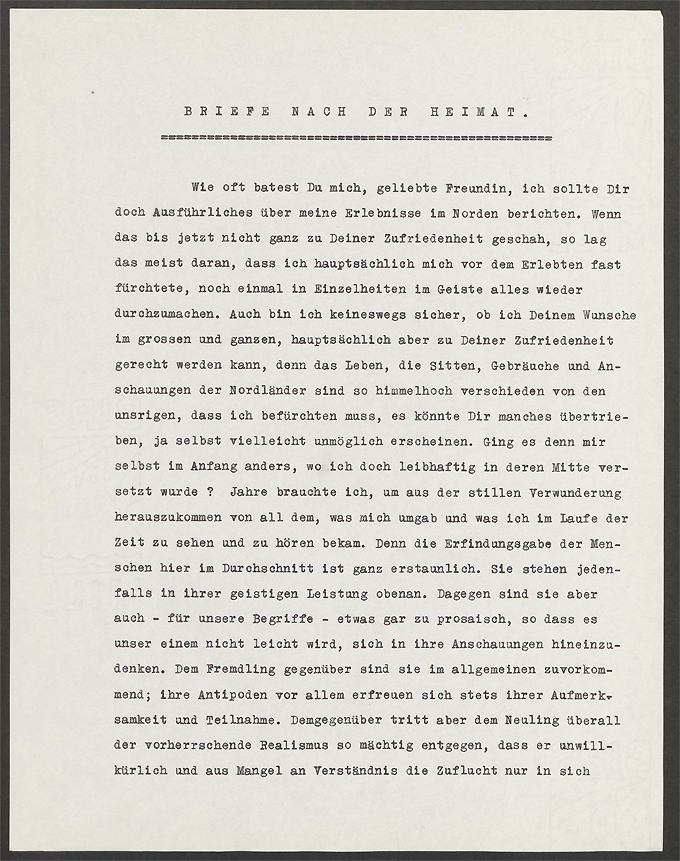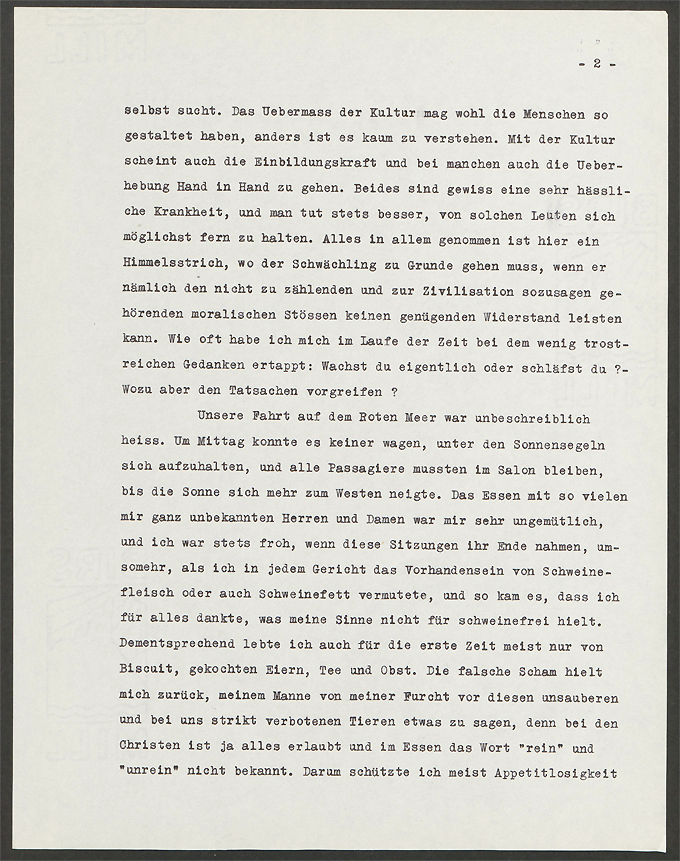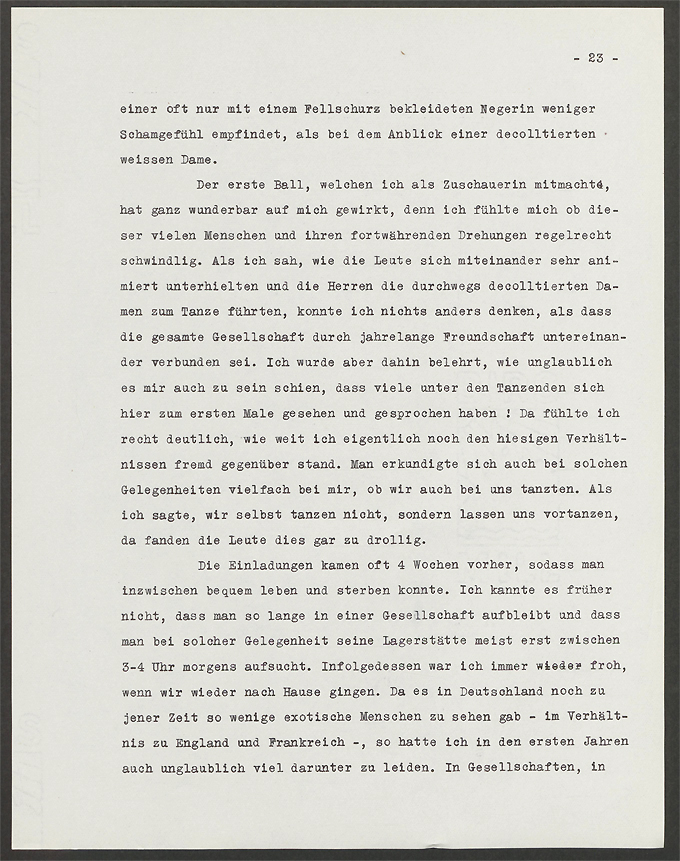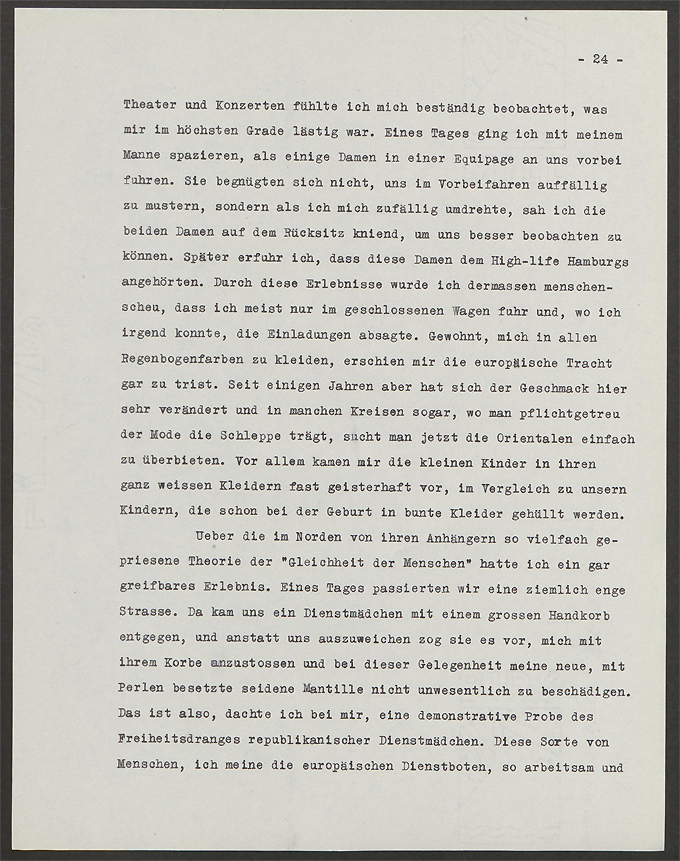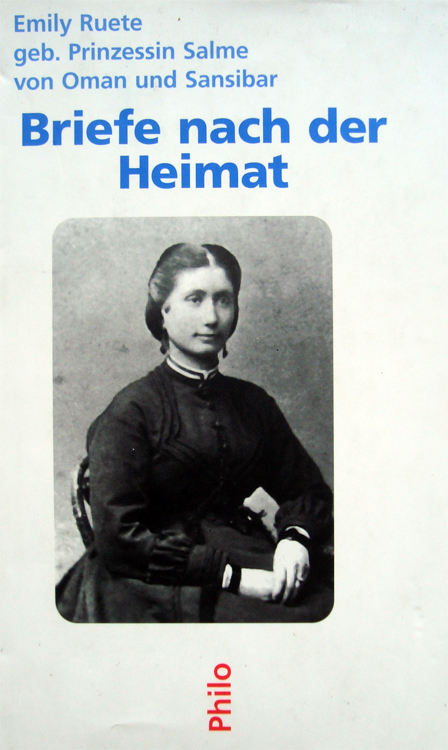“Dear friend, how often you've asked me to tell you at length about my experiences in the North. If I have not yet done this to your satisfaction it is mostly because I was almost scared of what I'd been through, of going over everything in detail again in my mind. [...]” (“Briefe nach der Heimat”, p. 1).
Emily Ruete's literary bequest contains the “Briefe nach der Heimat” [“Letters Home”] which relate her life from the time of her arrival in Germany until her move to Berlin in the late 1870s. It also contains two further short texts, the "Nachtrag zu meinen Memoiren" [“Postscript to My Memoirs”], which gives an account of her second, unsuccessful trip to Zanzibar in 1888, and the "Syrische Sitten und Gebräuche" [“Syrian Customs and Traditions”]. Greatly disappointed in both Germany's and Zanzibar's conduct towards her, Emily Ruete lived in Jaffa and Beirut between 1888 and 1914. The editor of the first published German version of the “Letters Home” (1999) suggests that the typoscript was likely produced in the mid-1920s and based on the handwritten original. A handwritten note on the Berlin State Library's copy tells us that it was “bestowed accompanied by a letter from Rudolph Said-Ruete (London), dated 7/9/1929 [...] Cannot be published or made available to the public either in whole or in part before 1 January 1940 without the permission of the bequeather or his heirs.”
Call number: Berlin State Library, Manuscript Section, Typoscript - Ms. Germ. Quart. 2289 acc. Ms. 1996.23
“At social gatherings and at the theatre and concerts I felt that I was being constantly watched, which annoyed me greatly. One day, as I was taking a walk with my husband, some ladies drove past us in a carriage. They were not content with openly staring at us in passing, rather, when I happened to turn around I saw both ladies kneeling on the back seat to get a better look at us [...]” (“Briefe nach der Heimat” , pp. 23-24).
The stares that Emily Ruete records receiving from the Hamburg public, and the gossip that circled about her which she describes on the pages of her “Letters Home”, featured here, are also depicted - and reproduced in part - in the illustrated magazine Daheim.
Call number: Berlin State Library, Manuscript Section, Typoscript - Ms. Germ. Quart. 2289 acc. Ms. 1996.23
This edition, which first appeared in 1989 with Athenäum Verlag under the title “Life in the Sultan’s Palace” and was later reissued by Philo Verlagsgesellschaft and most recently by Die Hanse Verlag, is a “lightly edited reprint” of the memoirs (with, for example, a new title and modernised spelling, some (mostly short) passages omitted, and without Emily Ruete’s foreword). Edited by the ethnologist and Islamic Studies scholar Annegret Nippa, the book also includes an afterword by her expanding on its context, with quotes from original documents such as the fairy tale-like narrations (Nippa identifies these as such) of Emily Ruete’s life – or “love” – story. “Life in the Sultan’s Palace” was reprinted by Die Hanse Verlag in 2010 for the 125th anniversary of the publication of the memoirs in 2011.
Private collection
This slightly abridged and lightly edited version of the longest section of Emily Ruete’s literary bequest was edited by Heinz Schneppen, a former German ambassador to Tanzania. His introduction and afterword describe the historical context of the writing of the “Letters’”, which he believes can be coupled with the memoirs, for “both texts come to life in comparison” (“Nachwort”, pp. 162-163). Schneppen also gives an account of the delay in the publication of the “Letters” (they were first published in English translation in 1993 as part of E. van Donzel’s book An Arabian Princess Between Two Worlds).
“I have recorded the first impressions that European life and the customs of the civilised world made on me in reverential memory and will perhaps later take the opportunity to give an account of this too”, writes Emily Ruete in her memoirs in the chapter entitled “Great Changes”, and with the ironic use of the term “civilised” that also plays a key role in her “Letters” (Memoiren einer arabischen Prinzessin, vol. 2, p. 143). She seems to hint at the potential later publication of these “Letters.”
Call number: Berlin State Library, 1 A 781722
